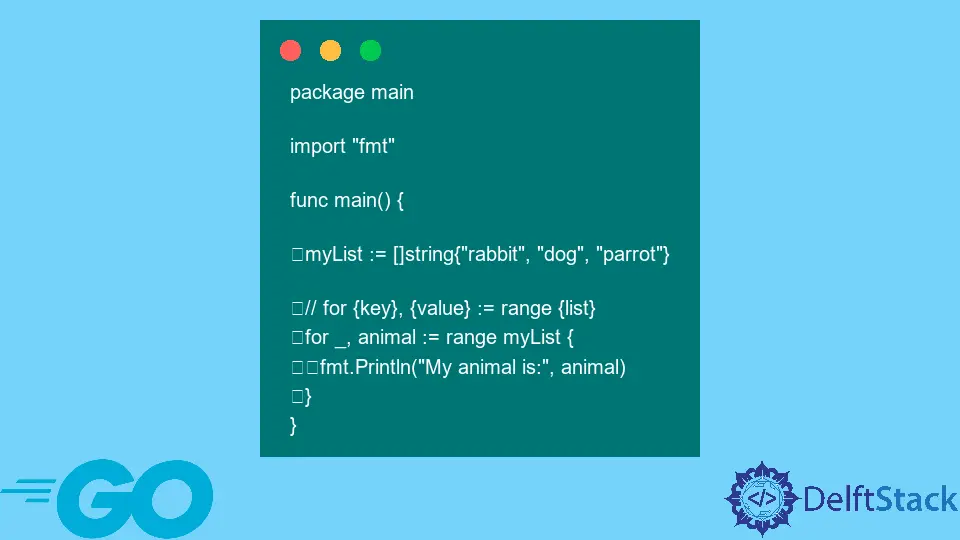The Foreach Loop in Golang
- Understanding the Foreach Loop Concept in Go
- Using the Foreach Loop with Maps
- Iterating Over Channels with the Foreach Loop
- Conclusion
- FAQ

When diving into the world of Go programming, one of the fundamental concepts you’ll encounter is the foreach loop. While Go does not have a traditional foreach loop like some other languages, it provides an elegant way to iterate over collections such as slices, arrays, maps, and channels using the for keyword.
This tutorial will guide you through the implementation of the foreach loop in Go, showcasing practical examples and explaining how to effectively utilize this powerful feature in your coding projects. By the end, you’ll have a solid understanding of how to iterate over various data structures in Go, enhancing your programming skills and efficiency.
Understanding the Foreach Loop Concept in Go
In Go, the for loop serves multiple purposes, including what you might typically think of as a foreach loop. The basic syntax allows you to loop over elements in a collection seamlessly. For instance, when you want to iterate over a slice, you can use the for range construct, which simplifies the process significantly.
Here’s a simple example of using the for range loop to iterate through a slice of integers:
package main
import "fmt"
func main() {
numbers := []int{1, 2, 3, 4, 5}
for index, value := range numbers {
fmt.Printf("Index: %d, Value: %d\n", index, value)
}
}
Output:
Index: 0, Value: 1
Index: 1, Value: 2
Index: 2, Value: 3
Index: 3, Value: 4
Index: 4, Value: 5
In this code, we define a slice of integers and use the for range construct to iterate through each element. The loop provides both the index and the value of each element, allowing for flexible access to the data. This is particularly useful when you need to perform operations that depend on both the position and the value of the elements.
Using the Foreach Loop with Maps
Maps are another essential data structure in Go, and the foreach loop can be particularly handy when working with them. The for range loop allows you to iterate over key-value pairs in a map efficiently.
Consider the following example where we have a map of employee names and their corresponding IDs:
package main
import "fmt"
func main() {
employees := map[string]int{
"Alice": 101,
"Bob": 102,
"Charlie": 103,
}
for name, id := range employees {
fmt.Printf("Employee Name: %s, ID: %d\n", name, id)
}
}
Output:
Employee Name: Alice, ID: 101
Employee Name: Bob, ID: 102
Employee Name: Charlie, ID: 103
In this example, we define a map where the keys are employee names and the values are their IDs. The for range loop allows us to access both the name and the ID in a clean and readable manner. This is particularly useful in scenarios where you need to process or display information from a map, making your code more concise and understandable.
Iterating Over Channels with the Foreach Loop
Channels are a unique feature of Go that facilitate communication between goroutines. The foreach loop can also be applied when working with channels. Using the for range loop with channels allows you to receive values until the channel is closed.
Here’s a simple example demonstrating how to use a foreach loop with a channel:
package main
import (
"fmt"
)
func main() {
numbers := make(chan int)
go func() {
for i := 1; i <= 5; i++ {
numbers <- i
}
close(numbers)
}()
for num := range numbers {
fmt.Println(num)
}
}
Output:
1
2
3
4
5
In this code, we create a channel named numbers and spawn a goroutine that sends integers from 1 to 5 into the channel. The for range loop then reads from the channel until it is closed. This approach is particularly useful for processing streams of data or coordinating tasks between multiple goroutines, showcasing the versatility of the foreach loop in Go.
Conclusion
The foreach loop in Go, implemented through the for range construct, is a powerful tool for iterating over various data structures like slices, maps, and channels. This feature not only simplifies the syntax but also enhances the readability of your code. Whether you’re processing collections of data or handling concurrent tasks, understanding how to effectively utilize the foreach loop will significantly improve your programming capabilities in Go. As you continue to explore Go, keep practicing with these loops, and you’ll find yourself writing more efficient and elegant code in no time.
FAQ
-
What is the foreach loop in Go?
The foreach loop in Go is implemented using thefor rangeconstruct, allowing you to iterate over slices, maps, and channels. -
Can I use the foreach loop with arrays in Go?
Yes, you can use thefor rangeloop to iterate over arrays in Go, similar to how you would with slices. -
How does the foreach loop handle maps in Go?
The foreach loop allows you to access both keys and values in a map, making it easy to process data stored in key-value pairs. -
Is the foreach loop in Go efficient for large datasets?
Yes, thefor rangeloop is optimized for performance, making it suitable for iterating over large datasets without significant overhead. -
Can I modify elements while using the foreach loop in Go?
While you can read values during iteration, modifying elements directly within afor rangeloop is not possible. You would need to use the index to modify elements in slices or arrays.